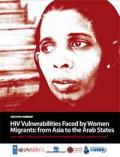Publications - Released in 2008
The Arab States are the primary destinations for many migrant workers from various countries in Asia, including Bangladesh, Pakistan, the Philippines, and Sri Lanka. Of these migrants, many are women: in 2005, 59 percent of Sri Lankan migrant workers were women, of which 90 percent were domestic workers, largely in the Arab States. Since 2000, women have comprised 90 percent of yearly deployment of new hires for service workers in the Philippines, of which 30 percent are employed as domestic help. A similar preference for the Arab States is observed in the case of Bangladesh, where between 1991 and 2007, 60 percent of female migrants left to find employment in the Arab States.
By analyzing the economic, socio-cultural, and political factors that influence the HIV vulnerability of migrant workers - especially female migrant workers - the study aims to aid the design of appropriate rights-based HIV prevention programmes. It also is intended to identify emerging challenges and trends in the response to HIV and migration issues in host countries, particularly in the area of human rights and public health.
Downloads
Organizations
- United Nations Development Programme (UNDP)
- Joint United Nations Programme on HIV/AIDS (UNAIDS)
- International Organization for Migration (IOM)






